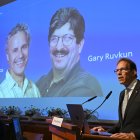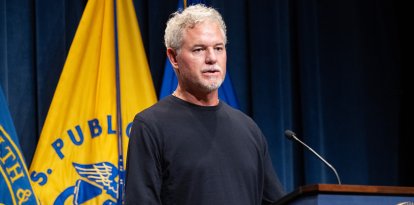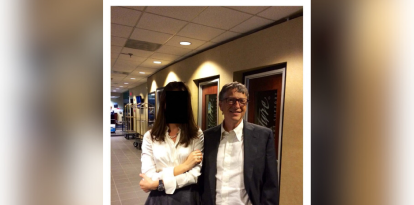Americans David Baker and John Jumper win Nobel Prize in Chemistry
They won the award for their work in predicting the structure of proteins with the help of artificial intelligence. They share the prize with Briton Demis Hassabisb.

Winners of the Nobel Prize in Chemistry
Americans David Baker and John Jumper and Briton Demis Hassabis won the Nobel Prize in chemistry Wednesday. They won the award for their work able to predict the structure of proteins with the help of artificial intelligence.
"The Nobel Prize in Chemistry 2024 is about proteins, life’s ingenious chemical tools. David Baker has succeeded with the almost impossible feat of building entirely new kinds of proteins. Demis Hassabis and John Jumper have developed an AI model to solve a 50-year-old problem: predicting proteins’ complex structures. These discoveries hold enormous potential," said Heiner Linke, chairman of the Nobel Committee for Chemistry.
According to the official Nobel Prize website, proteins are made up of 20 different amino acids, which can be described as the basic building blocks of life.
"In 2003, David Baker succeeded in using these blocks to design a new protein that was unlike any other protein. Since then, his research group has produced one imaginative protein creation after another, including proteins that can be used as pharmaceuticals, vaccines, nanomaterials and tiny sensors," the awards page detailed.
In that sense, it was explained that the second discovery refers to the prediction of protein structure. In proteins, amino acids are linked together in long chains that fold into a three-dimensional structure, which is decisive for the protein's function.
"Since the 1970s, researchers had tried to predict protein structures from amino acid sequences, but this was notoriously difficult. However, four years ago, there was a stunning breakthrough," he highlighted.
"In 2020, Demis Hassabis and John Jumper presented an AI model called AlphaFold2. With its help, they have been able to predict the structure of virtually all the 200 million proteins that researchers have identified. Since their breakthrough, AlphaFold2 has been used by more than two million people from 190 countries. Among a myriad of scientific applications, researchers can now better understand antibiotic resistance and create images of enzymes that can decompose plastic," the Nobel Prize statement added.


























